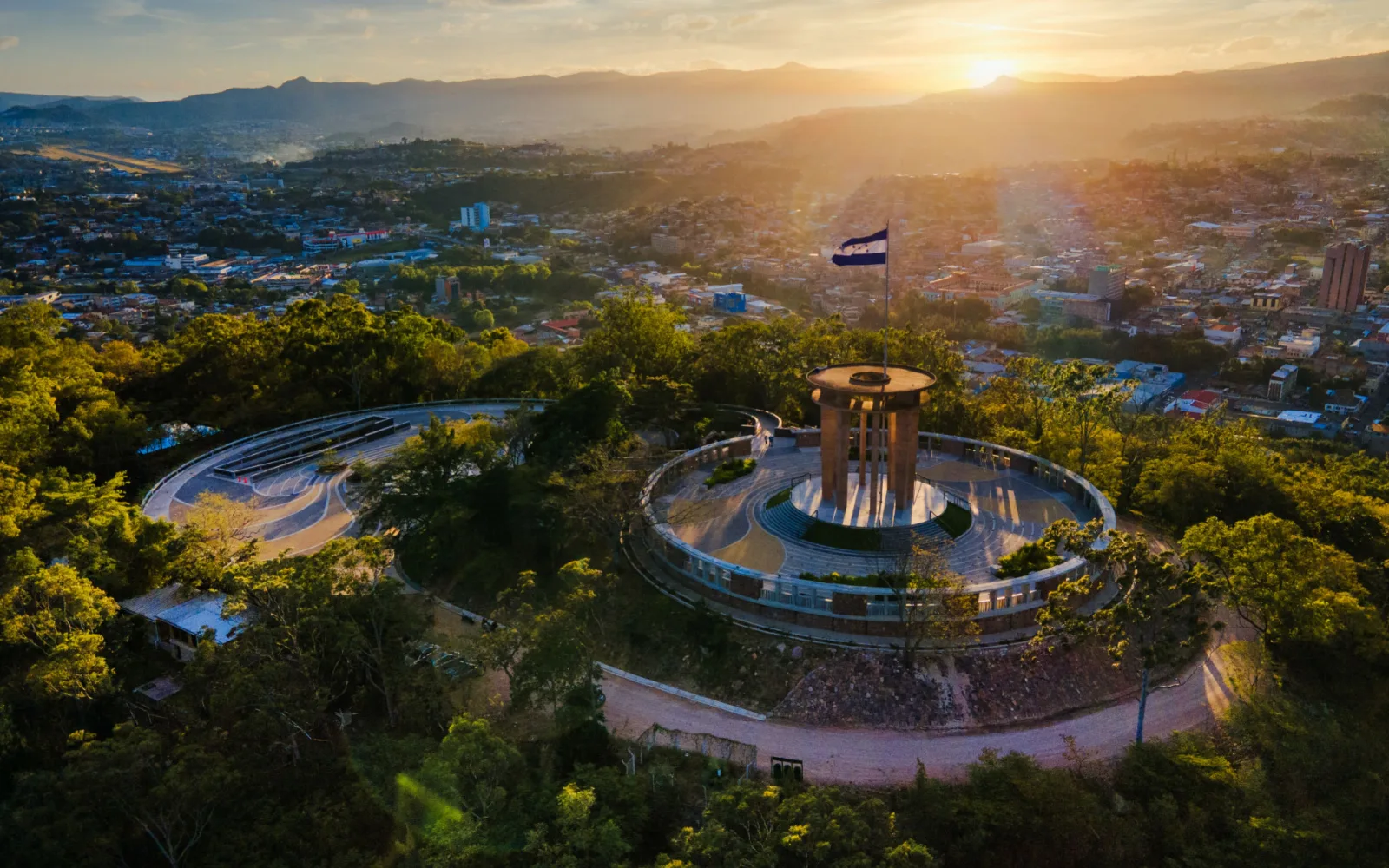What's the best time to visit Honduras?
The best time to visit Honduras is during the dry peak season from January to April. You’ll enjoy warm to hot temperatures, minimal rain, and ideal conditions for outdoor activities. While some areas may experience occasional showers, coastal regions and islands offer prime beach and water sport conditions.
January through March is perfect for white-water rafting and spotting whale sharks, while March and April have fewer crowds and various festivals to enjoy. Hotel prices are higher during this peak season, but it’s a fantastic time to experience Honduras’ culture and outdoor adventures.
Honduras is the crown jewel of Central America. Featuring 700 miles of beaches along the Caribbean coastline, ruins that tell the story of its past, dense jungles, and 99 stunning offshore islands, the question isn’t whether you should visit — all you need to know is the best time to visit Honduras!
We’ll take an in-depth look at the seasonal variations in Honduras, highlighting the overall best, cheapest, least busy, and worst times to go so you can plan the trip of a lifetime.
Overall Best Time to Visit Honduras
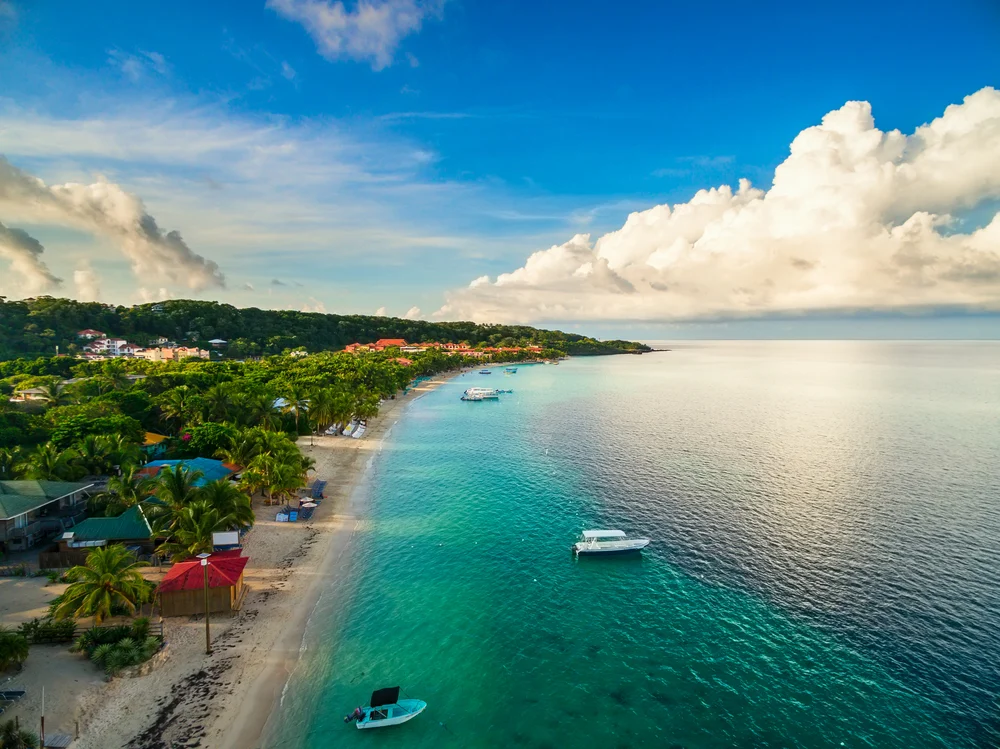
Guayo Fuentes/Shutterstock
The best time to visit Honduras is during the dry peak season from January to April. This time of year brings warm temperatures that border on hot, minimal rain, and the best conditions for outdoor activities.
Between January and April, you’ll bask in sunshine with temperatures ranging from 73°F to 92°F, depending on where you visit within the country. You’ll avoid the rainiest months of the year (late summer and fall) and enjoy the many festivals and events taking place during the peak season.
Rain isn’t completely out of the picture between January and April, and some parts of Honduras will still deal with occasional showers and storms. La Ceiba on the Caribbean coast and the Sula Valley are slightly wetter areas during the otherwise dry season, getting 1.2″ to 3.4″ of rain in January and February.
Still, many of the coastal areas and islands of Honduras offer prime beach and water sport conditions with beaches at Puerto Castilla, Telo, and Coxen Hole seeing little rain and lots of sunshine this time of year.
You’ll find plenty of chances to go snorkeling, dive on the massive Mesoamerican Reef to see colorful marine life up-close, take boat cruises, kayak, kitesurf, or parasail in Honduras’ crystal clear oceans and mighty rivers.
January through March is an ideal time for white-water rafting down Rio Cangrejal. In February, March, and April, you’ll have the best chances to spot whale sharks swimming, especially around Utila island.
March and April see a significant drop in tourist numbers as the peak season begins to wind down, making these ideal months for a visit if you’re being mindful of your budget and want to avoid the biggest crowds.
Hotel prices are a little higher since it’s the peak season. Here’s what you can expect to pay nightly (2-5 star hotels):
- January: $56-$159/night
- February: $56-$402/night
- March: $60-$235/night
- April: $57-$278/night
One of the reasons January through April is our favorite time to visit Honduras is that there’s so much going on around the country. If you’re looking for events and festivals to attend while you’re in Honduras during the peak season, check out the following:
- Guancasco (late January) celebrates the Lenca indigenous people with traditional dance (guancasco, or meeting) that symbolizes peace agreements as a special figure is moved from village to village.
- Day of the Three Wise Men (January 6) is also known as Three Kings Day and celebrates the wise men bringing Jesus gifts after hearing of his birth. People celebrate with feasts and street parades dressed as the 3 wise men.
- Artisan Festival (February) is called Feria de Artesania de La Ruta Lenca locally and features hand-made, artisan products that represent La Paz, Intibucá, Lempira, Copán, and Comayagua regions with wood, fabrics, jewelry, food, and pottery.
- Virgin of Suyapa’s Day (February) honors Honduras’ patron saint carved in cedar wood during the first 2 weeks of February with parades, food, drinks, dancing, and music in the streets.
- Dance of the Devils (mid-February) features traditional Comayagua dance and traditions like masks, colorful costumes, and the “little devil’s dance” as the community meets in Comayagua to keep the customs alive.
- Indigenous Music Festival (late March) in Nueva Celilac brings together the traditional music and instruments of Honduras’ indigenous tribes for a full day of music, dance, and fun.
- Semana Santa (March or April) is Holy Week, the week surrounding Easter with parades, religious figure and artifact displays, community feasts, plays, and more in cities across Honduras.
- Day of the Americas (April 14) is also called Pan American Day and celebrates the union of the American republics in 1890 with parades, live music and dance, art displays, and food booths.
- Punta Gorda Festival (April 12) commemorates the Garifuna peoples’ arrival on the Honduras island of Roatan with live performances and plays, traditional dress, food fairs, and drum circles.
The earlier in the season you visit, the milder the weather will be, but that comes with a slightly higher chance of rainfall. We really like March and April for an all-around great visit!
Cheapest Time to Visit Honduras
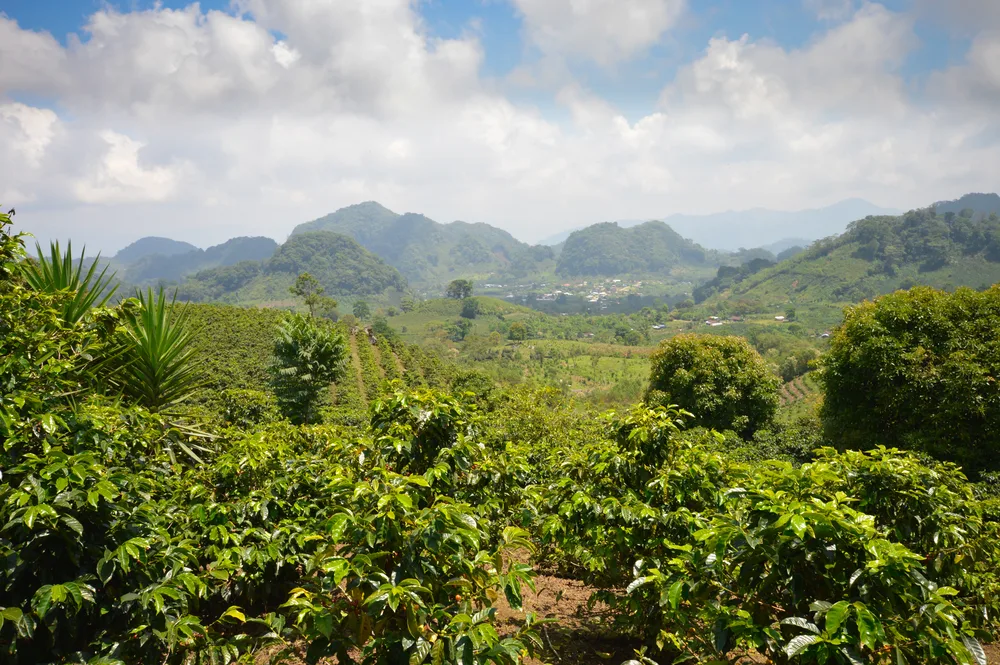
Svetlana Bykova/Shutterstock
The cheapest time to visit Honduras is between October and January. These months see rock-bottom prices on hotels from budget options to high-end resorts, dropping the total cost of your trip.
Prices are a lot lower between October and January in Honduras. So what’s the catch? It’s the heavy rain. You’ll also catch the tail end of hurricane season if you visit in October or November.
Honduras is very rainy during this part of the year, seeing the most rainfall of any season in the months of October and November. By December and January, the rains begin to taper off but most areas still experience 2-10 rainy days a month this time of year.
It’s not all bad, though. Temperatures are a bit cooler and more comfortable this time of year, ranging from about 72°F to 87°F and offering a nice reprieve from the summertime heat. If you can plan your outdoor adventures and beach trips in between rainy days, it’s very possible to enjoy a fabulous trip to Honduras between October and January.
The increased precipitation keeps many tourists from visiting Honduras during the fall and winter months, leading hotels and resorts to slash their usual rates in an attempt to attract visitors. You can benefit from that and book great rooms at amazingly low prices!
- October: $69-$181/night
- November: $65-$158/night
- December: $50-$178/night
- January: $56-$159/night
While you’re here in the rainy season, there are plenty of things you can get into.
This is the perfect time to go white-water rafting (Class III and IV rapids) down Rio Cangrejal as the rains swell the river! It’s a good time for a hike in the beautifully lush cloud forest at Cusuco National Park in Corinto.
Festivals and events can make a visit during this time of year even more special. Check out the following across the country:
- El Grande de Grandes (late October) is an international dance competition where people come to compete with their best representations of traditional dances from indigenous Honduran tribes and cultures.
- Mountain Mandarin Festival (mid-November) happens in Mata de Platano to celebrate the region’s orange harvest with Mandarin-themed activities, crafts, food, drinks, and music.
- Noche Buena (December 24) on Christmas Eve sees celebrations across Honduras, featuring community feasts, special nacatamales, fruit baskets, drinks, and children parading through the streets.
If you decide to come during the rainy season in the interest of saving money, try to plan your visit in December or January to avoid the heaviest rains and still enjoy great pricing on hotels.
Least Busy Time to Visit Honduras
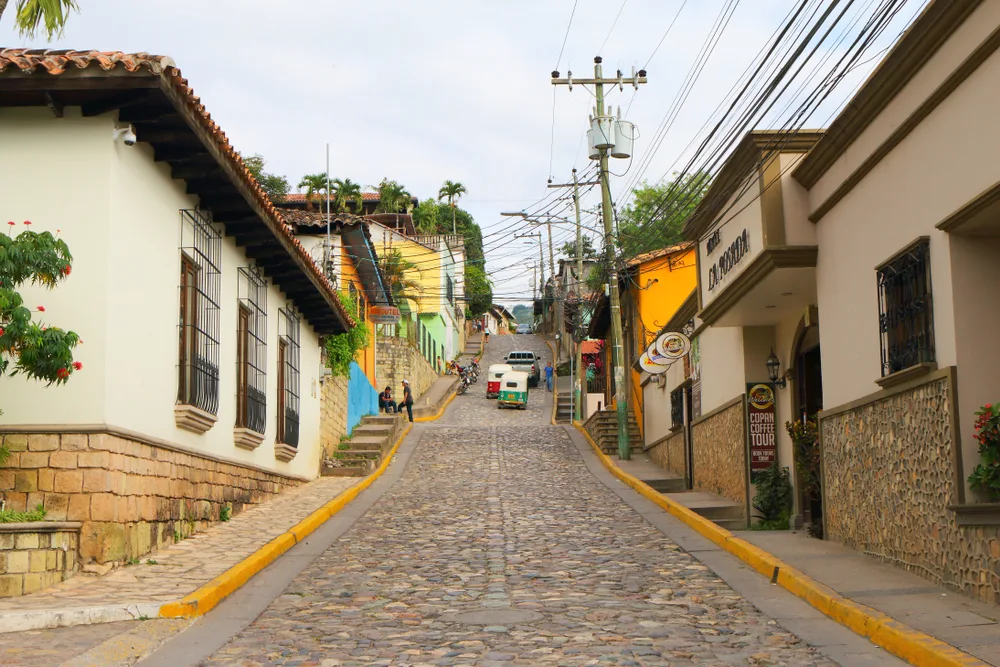
COPAN, HONDURAS – NOVEMBER 2018: unidentified people are walking through the old town on November 7, 2018 in Copan, Honduras, central America/Judith Lienert/Shutterstock
The least busy time to visit Honduras is during the months of April-May and July. These spring and late summer months see fewer visitors than any other and guarantee wide-open hotel and flight availability.
If you’re turned off by the idea of spending your days on crowded beaches, struggling to find a great room in a popular area, or scrambling to book a flight during the peak season, visiting in April, May, or July will be perfect for you.
Expect warm to hot temperatures during these months with highs ranging from 81°F to 92°F in April and May and slightly cooler temperatures between 79°F to 90°F in July.
The rainfall won’t be too bad in April, but things begin to get wet in May (up to 2.8″ of rain) and conditions are really wet come July (3.1″ to 4.3″ of rain). July is also part of the June-November hurricane season.
The extra rain means Honduras’ jungles and rainforests are absolutely stunning this time of year.
It’s a great time to hike into the national parks like the cloud forests of La Tigra or the mountainous forests of Celaque National Park in the west. In between storms, you’ll find this less-crowded time of year a great time to visit the Copan Mayan ruins in the western region or the Lencas ruins and pyramids in Yarumel.
Another bonus to visiting in April, May, or July is the slightly-reduced pricing on hotels and resorts across the country. Here’s a look at 2-5 star hotel rates this time of year:
- May: $68-$235/night
- June: $68-$255/night
- July: $57-$255/night
- August: $65-$245/night
- September: $74-$255/night
- October: $69-$181/night
- November: $65-$158/night
- December: $50-$178/night
There are several fun and culturally engaging festivals and events happening this time of year in different parts of Honduras (note there will be bigger crowds at these events):
- La Ceiba Carnival (May) honors the patron Saint Isidore the Laborer with music, dancing, food, drinks, and huge parades on the 3rd or 4th Saturday in May.
- Rain of Fish (May or June) celebrates a strange phenomena where fish are said to rain from the skies in Yoro during monsoon season. Locals gather with parades and praise for the answered prayer of abundance.
- National Mushroom and Wine Festival (June or July) offers food, crafts, wine, and a focus on the country’s favorite mushroom, “choro,” in La Esperanza. The parade of the “giant ladies,” delicious food featuring the mushroom, and regional wines make it a blast.
- Potato Festival (July) is locally called Feria de La Papa and celebrates all things potato with potato-based dishes, storytelling, music, dancing, and more in La Esperanza.
- Lempira Festival (July 20) honors the country’s resistance against Spain with proud cultural displays, traditional costumes and music, food, and storytelling with parades and craft displays.
- National Garifuna Festival (late July) in Bajamar honors the Garifuna peoples’ arrival with singing, dancing, and street parades through the town.
We really like October, November, and December for the best deals on high-end hotels and resorts around the Caribbean coast of Honduras, while July and December have the best rates on budget hotels.
Worst Time to Visit Honduras
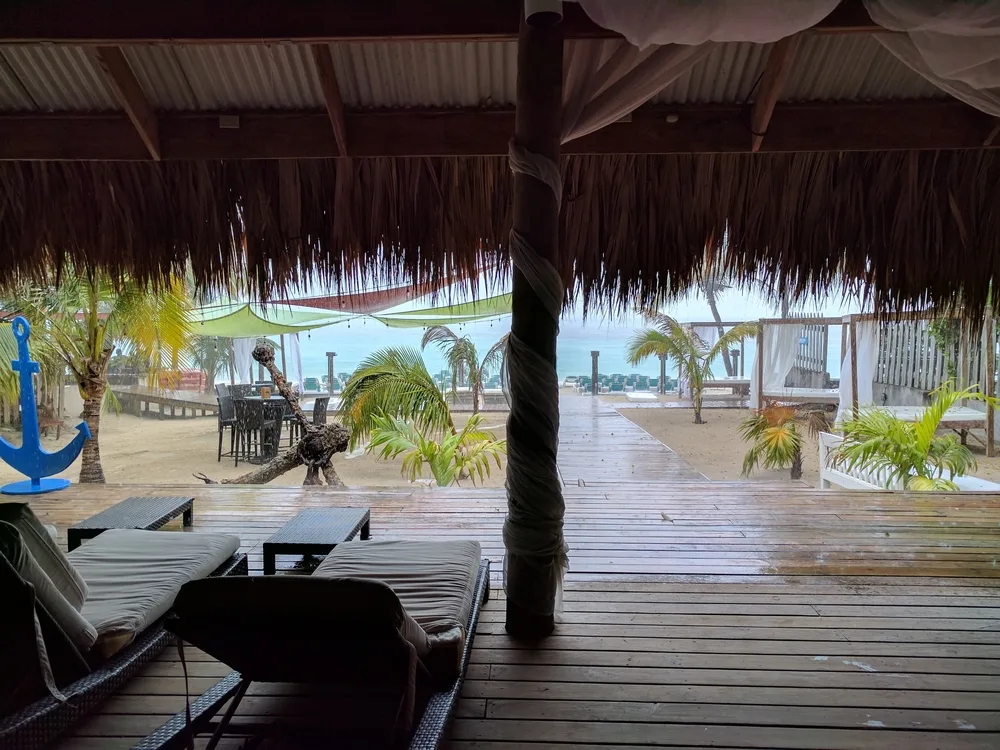
Ifbuezo/Shutterstock
The worst time to visit Honduras is during the rainiest months of the year, October and November. Rain and hurricanes can ruin outdoor plans and make some roads and areas impassable.
October highs hover between 83°F to 87°F, while November cools off slightly with highs ranging from 81°F to 84°F across Honduras. Temperatures are nice and mild thanks to the extra rainfall.
Rain varies quite a bit by region in Honduras, ranging from 1.5″ (Santa Rosa de Copan in November) to 7.7″ (Coxen Hole in October) of rainfall per month. It’s very important to look at weather forecasts before you travel this time of year!
October and November represent the end of hurricane season in Honduras, which can lead to strong winds, storm surge flooding, rip currents, and tornadoes in some regions.
On the plus side, you’ll find that hotel prices are low this time of year due to fewer tourists traveling to Honduras at this point in the rainy hurricane season:
- October: $69-$181/night
- November: $65-$158/night
If you must travel to Honduras in October or November, you’ll be able to check out some festivals and events.
Some are already listed above (El Grande de Grandes and Mountain Mandarin Festival) that happen in October and November, plus the Ceremony of Tzikin takes place at the Mayan ruins of Copan during the entire month of November.
Overall, October and November see too much rain and hurricane risk to be worth visiting, but if you head to less rainy areas like Santa Rosa de Copan or San Pedro Sula, you’ll enjoy slightly drier conditions.
Things to Consider
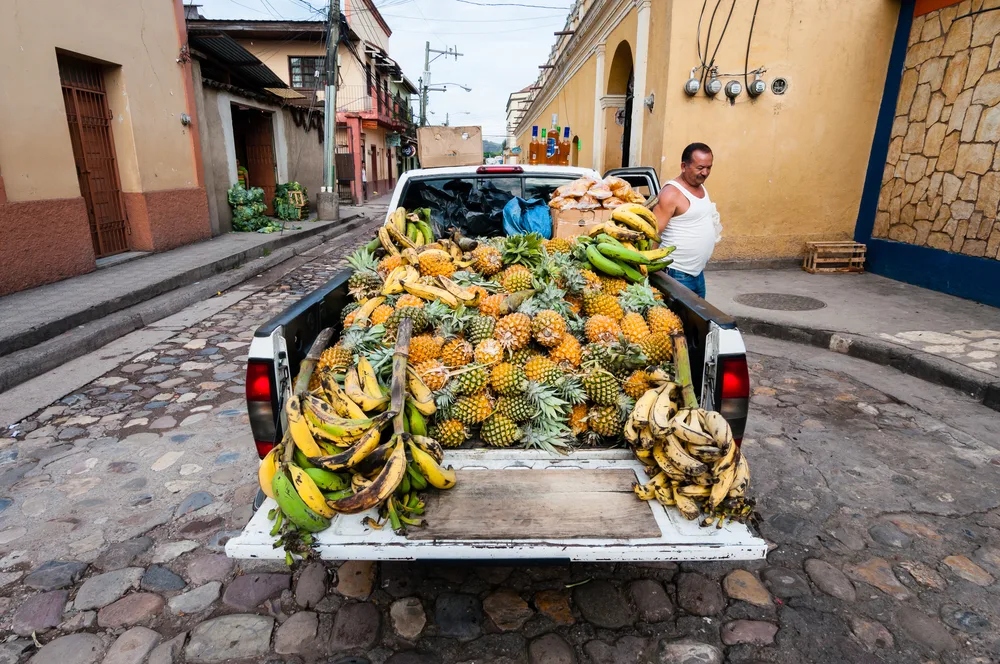
COPAN, HONDURAS, MAY 29, 2013: Unknown Honduran Farmer presenting his pineapple crops on a local market/JKom/Shutterstock
Honduras is an amazing glimpse of the culture, natural beauty, and wonder of Central America. You’ll make the most of your visit here when you keep the following tips in mind.
- Bring cash for your visit. When you visit Honduras, prepare for the possibility that some hotels, restaurants, shops, and merchants won’t accept card payments. Bring cash with you! Tourist areas, like the Bay Islands and many popular hotels, will accept U.S. dollars without issue. Still, it’s a good idea to exchange some cash for Honduran Lempira to be sure your money will be accepted.
- Don’t drink the tap water. The tap water (including ice and drinks made with it) in Honduras isn’t safe for drinking, so you should rely on bottled water while you’re in the country. Bottled water is the most popular and common choice in Honduras, so all restaurants, stores, and hotels will offer it.
- You may experience power outages. Honduras is a developing country with a less-stable power grid in times of storms or in the event of electric issues. When power outages hit, they can affect not only the whole country of Honduras, but other Central American countries, too. Bring backup power supply and solar chargers when you visit.
- You can go visa-free. You’ll need a valid passport to visit Honduras as a U.S. citizen, but no tourist visa is required for entry. If you’re staying in the country for less than 90 days, all you need is your passport and a bag packed with all your essentials!
Frequently Asked Questions
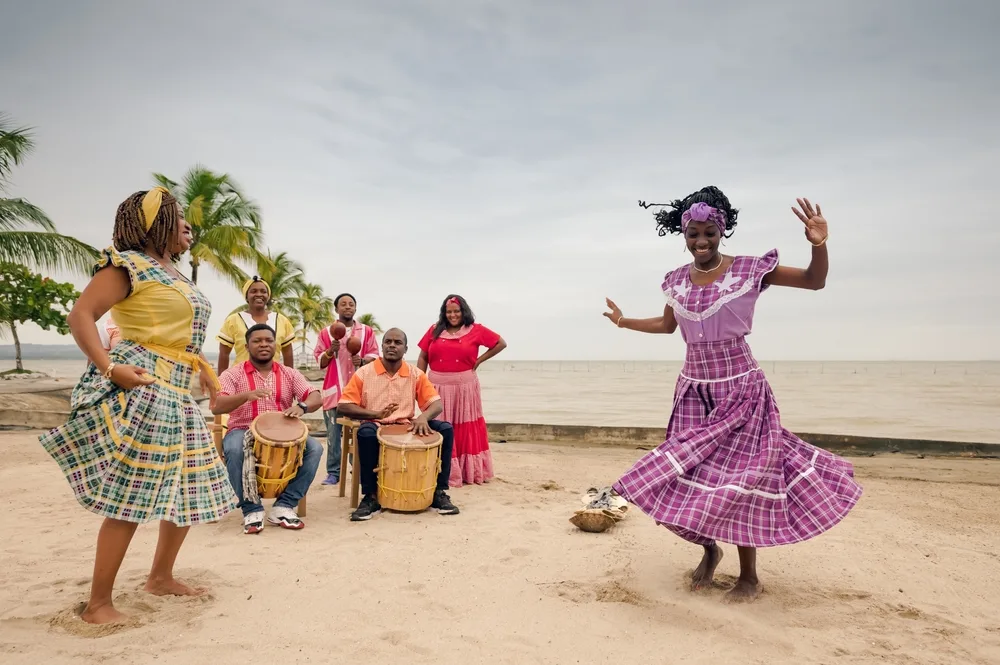
Salmonnegre-Stock/Shutterstock
If you’re thinking Honduras sounds great for a visit, check out the most frequently asked questions below to learn more before you start planning.
Is Honduras cheap for tourists?
Honduras is usually pretty cheap to visit, depending on what type of accommodations you choose and where you go within the country. Plan on spending between $30-$100 per day, per person (not including accommodations).
The mainland is generally cheaper to visit than the offshore islands, like the Bay Islands, which are more popular with tourists and command higher prices. Visit outside of the January to June peak season for better prices country-wide.
What is the rainy season in Honduras?
Honduras experiences two rainy seasons: A lesser rainy season from June through August and a heavier rainy season from September to November. October and November are the wettest months of the year in Honduras.
Some regions are much rainier than others, with islands and towns along the Caribbean coast seeing a lot more monthly rainfall than towns further inland.
What is Honduras hurricane season?
The hurricane season in Honduras runs from June to late November each year, encompassing the warm and rainy months of the year when tropical storms are more common.
Hurricanes rarely hit Honduras. Most recently, Hurricane Pilar in October 2023 came close and hit Nicaragua, but Honduras wasn't hit.
What is the best month to visit Roatan?
The island of Roatan sits about 35 miles north of Honduras in the Caribbean Sea. Its location makes it experience heavy rains during the late summer, fall, and early winter, so late winter (January through April) is generally the best time to visit Roatan.
During this time of year, Roatan experiences clear skies, little rain, and excellent water conditions for snorkeling, diving, and hanging out on the beaches.
What is the warmest month in Honduras?
May and June are the warmest months in Honduras, bringing temperatures in the 80s and low 90s across the mainland and islands.
May is the better choice for a visit during the warmest period because it has less rainy weather than June.
So, What’s the Best Time to Visit Honduras?
Overall, January to April is the best time to visit Honduras for warm weather with little rain and great opportunities to play in the country’s gorgeous beaches, forests, rivers, and towns.
Saving money might be important for your trip, so keep the months between October and January in mind for a more affordable stay (but be prepared for rain and hot temperatures).
If you just want to avoid the biggest crowds, come in April, May, or July. You’ll find fewer people visiting Honduras this time of year and fair prices on hotels and attractions.
If you can, avoiding visiting in October or November — the rainiest months of the year, though prices are low and crowds are very small.
Honduras offers so much for travelers to see and experience, from beaches and cloud forests to thrilling adventures on the water and cultural festivals year-round. If you’re ready to add Honduras to your list, this is your sign to start planning!



